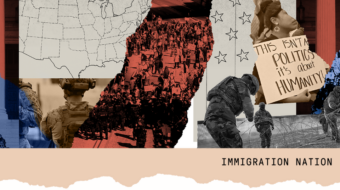Numerous civil liberties and human rights organizations have issued a letter calling for the United States government to suspend further deportations of immigrants back to Haiti as long as the current cholera epidemic is raging.
Writing in the Los Angeles Times, Linda Shrieves reports that a study soon to be released by the University of California San Francisco and the Harvard Medical School will show that the cholera epidemic in Haiti, which started last fall and has killed about 4,000 people so far, is likely to continue through most of this year and eventually infect up to 800,000 people.
Cholera is treatable if caught in time, but Haiti’s poverty and the destruction of infrastructure and health facilities caused by the Jan. 13 earthquake, which killed as many as 300,000 Haitians, means that patients often get medical care too late. There are foreign medical teams working in Haiti, including an outstanding Cuban contribution, but the country is not in condition to be dealing with Haitian immigrants deported from the U.S.
Under legislation passed in 1996, the United States deports non-citizens legally in the United States if in the past they have been convicted of certain felonies and misdemeanors. The 1996 legislation took away from immigration judges the right to take many extenuating circumstances into consideration when ordering such deportations, even in cases in which the individual has had no further problems with the law for decades, and has a U.S. citizen as a spouse and children who are also citizens. Changing this law has been a major demand of the immigrants’ rights movement in the United States.
Shortly after the earthquake, Haitian-American and human rights groups persuaded the Obama administration to suspend the deportation of Haitian immigrants, but late last year this suspension was unexpectedly lifted by the Department of Homeland Security, and the deportation of Haitian citizens (with or without immigration papers) who had run afoul of U.S. criminal laws was begun again. Haiti’s policy is to jail all such deportees for an indefinite period, even if they had already completed the sentences in the United States for the crimes for which they had been convicted.
Earlier this year, U.S. human rights monitors visited an initial group of 27 deportees, sent back Jan. 20 and currently in detention in Haiti. The prisoners were found to be living in subhuman conditions, with nonexistent sanitation and brutal treatment by guards. One of the deportees, 34-year-old Wildrick Guerrier, died shortly after being placed in detention in Haiti, of what well may have been cholera.
On March 7, the government issued a new policy statement confirming that deportations would resume (after they already had resumed). The public was given until March 18 to comment on the new policy. Human and immigrants’ rights advocates complain that this is too short notice, and that the process has not been transparent. They also point out that on the same day that deportations resumed, Dec. 9 2010, the State Department issued a travel warning to avoid unnecessary trips to Haiti because of the cholera outbreak. The Inter-American Commission on Human Rights has also called for the suspension of deportations to be extended.
A letter addressed to President Obama, Secretary of Homeland Security Janet Napolitano and Secretary of State Hillary Rodham Clinton, is being circulated by a long list of organizations and concerned individuals, including the Human Rights Clinic and the Immigration Clinic of the University of Miami Law School, the Center for Constitutional Rights in New York, the Florida Immigrant Advocacy Center, Alternative Chance and the Loyola University Law Clinic and Center for Social Justice.
The letter calls for the government to. “Immediately halt all deportations to Haiti…grant deferred action and/or stays of removal to all Haitians with final orders of removal; meet with representatives of the undersigned organizations to discuss the March 7, 2011, policy; immediately halt roundups of Haitian nationals in the United States and release those currently in custody; extend the comment period for at least one month and simultaneously suspend deportations to permit a true review process, and publicly release information about the basis for the newly announced DHS policy, and explain what assessment was conducted of the circumstances in Haiti prior to the change in policy.”
The sponsors of the letter are asking organizations and individuals of goodwill to sign onto this letter before the March 18 ending date for comments.










